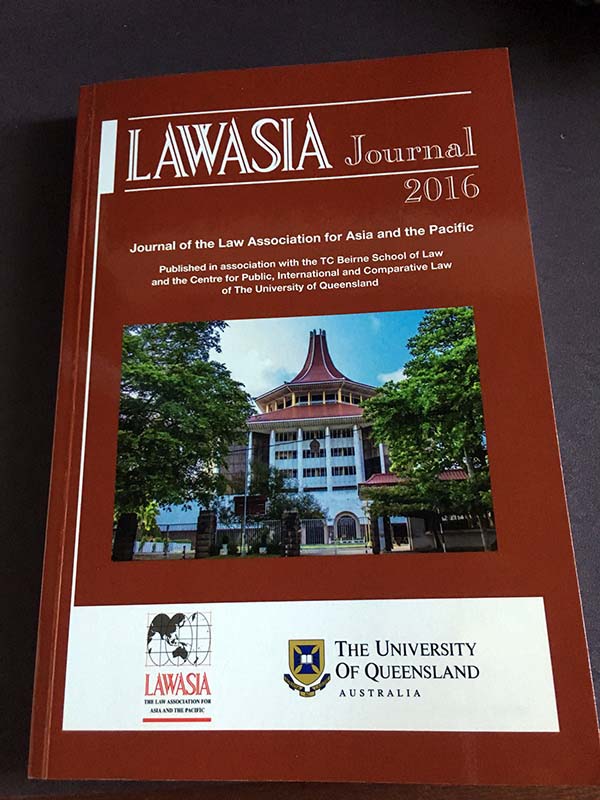 LAWASIA is an international association representing the legal profession across the Asia-Pacific region with members drawn from 50 countries. Each year, the TC Beirne School of Law produces the LAWASIA Journal which aims to further the diffusion of knowledge and understanding of the laws and legal systems of countries within the region.
LAWASIA is an international association representing the legal profession across the Asia-Pacific region with members drawn from 50 countries. Each year, the TC Beirne School of Law produces the LAWASIA Journal which aims to further the diffusion of knowledge and understanding of the laws and legal systems of countries within the region.
The 2016 volume of the LAWASIA Journal, edited by Associate Professor Peter Billings and lecturer Dr Enshen Li, contains valuable contributions from early career scholars, professors and senior members of the judiciary drawn from many different jurisdictions across the Asia-Pacific. The 2016 volume features five peer-reviewed articles addressing wide-ranging and topical legal issues including, Fijian constitutional law, environmental law and governance in Indonesia and the rule of law in Singapore.
Dr Mimi Zou (Chinese University of Hong Kong) writes on ‘China’s Fragmented Occupational Safety and Health Regime’, examining how gaps in workplace laws contribute to incidents like the Tianjin chemical explosion that killed 173 people. Dr John Mugwamba (Murdoch University) discusses judicial controversies over having ‘fraud’ as exception to the indefeasibility of title.
Professor Nicholas Aroney and Professor Jennifer Corrin (The University of Queensland) examine the lack of constitutional continuity in Fiji and how that can only be properly understood in the light of Fijian cultural beliefs and practices. They ask whether H L A Hart’s theory of law can account for what has transpired in Fiji. Relatedly, Nainendra Nand (University of the South Pacific, and formerly Solicitor-General of Fiji) compares the 1997 and 2013 Fijian constitutions. Nand considers that although the new constitution introduces welcome aspects, such as the elimination of race-based districts, it also removes power from Fiji’s Bill of Rights, and reduces the potential for the Constitution to be judicially reviewed in future.
Dr Alice de Jonge (Monash University) examines how the state duty to consult indigenous peoples might strengthen Indonesia’s future environmental governance. She argues that in order to meet the country’s international law obligations, Indonesia will need to draw more heavily on its indigenous peoples to assist with environmental regulation, monitoring and negotiation functions.
The LAWASIA Journal also includes two recent judicial speeches, by The Honourable Chief Justice Sundaresh Menon, on the rule of law in Singapore, and The Honourable Chief Justice James Allsop AO, on how values shape the application of law.
Associate Professor Peter Billings said he believed the general and specialised nature of the scholarly contributions to the volume would be of great interest and benefit to lawyers and academics working in the region. In particular, he was pleased that several articles related to the core objectives of the LAWASIA association, namely, the protection of human rights and maintenance of the rule of law in the region.



